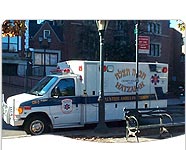 |
 
Insulin Resistance Portends Congestive Heart Failure
By Neil Osterweil , MedPage Today Staff Writer - Reviewed by Rubeen K. Israni, M.D., Fellow,
Renal-Electrolyte and Hypertension Division, University of Pennsylvania School of Medicine
MedPage Today Action Points
•
Advise patients that impaired glucose tolerance/insulin sensitivity puts them at risk for
future congestive heart failure.
•
Explain the importance of strict glucose management in preventing future complications,
including cardiovascular disease, renal disease, retinopathies and neuropathies.
•
Counsel obese patients and those with high waist circumferences about diet, exercise, and
overall weight management strategies.
UPPSALA, Sweden, July 19-Insulin resistance is an important risk factor for congestive heart failure
independent of diabetes, reported researchers here.
In a study of nearly 1,200 elderly men who were free of congestive heart failure (CHF) or valvular
heart disease at baseline, investigators at Uppsala University found that even when controlling for other
causes of CHF, insulin resistance remained an independent risk factor. The controlled variables included
previous myocardial infarction, hypertension, diabetes, or smoking.
The finding also points to a likely role for insulin resistance in the development of CHF associated
with obesity, Erik Ingelsson, M.D., and colleagues reported in the July 20 issue of the Journal of the
American Medical Association.
The link between diabetes and CHF was first described by Framingham Heart Study researchers in the
mid 1970s. More recently obesity has been fingered as a major risk factor for CHF as well. The two largest
risk factors for CHF are hypertension and coronary heart disease, as well as metabolic and lifestyle factors.
"In recent years, associations between diabetes or impaired glucose regulation and altered left ventricular
geometry and function have been reported," the authors wrote. "Furthermore, in patients who manifest CHF,
insulin resistance is associated with more severe disease and a worse prognosis, but insulin resistance has
not been investigated as a predictor of CHF."
To test their hypothesis that insulin resistance may predict CHF and could be the agent for CHF in obesity,
the investigaors followed a cohort of 1,187 men 70-years-old and older who were free of both CHF and valvular
disease at baseline. The men were followed from 1990-95 to 2002 (median follow-up, 8.9 years).
The investigators analyzed variables reflecting insulin sensitivity and obesity together with established
risk factors for CHF, which include prior MI, hypertension, diabetes, electrocardiographic left ventricular
hypertrophy, smoking, and serum cholesterol level.
Insulin sensitivity and other glucose metabolic parameters were measured by euglycemic clamp glucose disposal
rate (mg/kg body weight per min), fasting plasma glucose, two-hour oral glucose tolerance test (OGTT) fasting
insulin and proinsulin, fasting 32-33 split proinsulin and HOMA insulin resistance index.
During the study, 104 men developed CHF, an incidence rate of 10.5 per 1,000 person-years at risk. In
unadjusted Cox proportional hazards analyses, all of the variables indicating impaired glucose regulation
and obesity significantly predicted CHF.
When the presence of diabetes at baseline was accounted for, most of the variables related to insulin
resistance remained as significant predictors of CHF, including clamp glucose disposal rate, OGTT, fasting
insulin, proinsulin, and 32-33 split proinsulin, body mass index (BMI), and waist circumference.
Further adjustment for other baseline risk factors failed to eliminate the insulin sensitivity measures
clamp glucose disposal rate, OGTT, fasting proinsulin, the obesity measures BMI and waist-circumference,
indicating that both insulin sensitivity and obesity are independent risk factors for CHF.
They also found a strong correlation between variables indicating impaired glucose tolerance and obesity
(Pearson r=-0.60, P < .001 for clamp glucose disposal rate versus both BMI and waist circumference).
Noting the established link between diabetes and CHF, the authors acknowledged that incipient diabetes,
as indicated by impaired glucose tolerance at baseline, could account for some of the cases of CHF observed.
"Still, we show that impaired glucose regulation in healthy participants without diabetes or obesity at
baseline is a strong predictor of subsequent CHF, independent of established risk factors," they wrote. "Our
observations may indicate that the risk for CHF is already increased in the long subclinical phase of impaired
glucose regulation that precedes clinically manifest diabetes."
They speculated that insulin resistance either precedes obesity in a causal pathway to CHF, "or simply that
the relation of obesity to CHF is circumstantial and that obesity in this case may be regarded as an indicator
of the more important trait, insulin resistance."
Primary source: JAMA - Source reference: JAMA. 2005;294:334-341
________________________________________
Disclaimer - The information presented in this activity is that of the authors and does not necessarily
represent the views of the University of Pennsylvania School of Medicine, MedPage Today, and the commercial
supporter. Specific medicines discussed in this activity may not yet be approved by the FDA for the use as
indicated by the writer or reviewer. Before prescribing any medication, we advise you to review the complete
prescribing information, including indications, contraindications, warnings, precautions, and adverse effects.
Specific patient care decisions are the responsibility of the healthcare professional caring for the patient.
Please review our Terms of Use. © 2004-5 MedPage Today, LLC. All Rights Reserved.
The above is for general informational purposes only. Always consult your
physician regarding specific medical issues and call Hatzalah or your local
ambulance service in the event of an emergency.
Back to Digest Index
|









